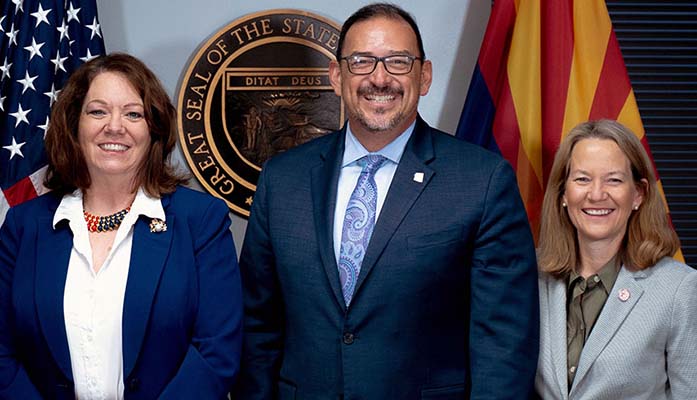
Secretary of State Adrian Fontes hasn’t been doing his job with maintaining voter rolls, according to a recent and thorough scolding he took in court over it.
In a Friday hearing for 1789 Foundation Incorporated v. Fontes, court transcripts document how Arizona District Court Judge Steven Logan admonished Fontes’ counsel — Karen Hartman-Tellez with the attorney general’s office — for Fontes failing to properly oversee the voter rolls.
“I would think that as the secretary the first thing I would want — […] I would think that the state hired me to make sure that the entire system could be trusted and administered correctly,” said Logan.
Fontes didn’t appear in court, either, for which the judge took Hartman-Tellez to task, asking her why she, a lawyer from the Attorney General’s Office, was defending the case rather than one of Fontes’ attorneys within the secretary of state’s office. Hartman-Tellez said that he and the rest of his office were “incredibly busy” — a reason that didn’t satisfy Logan.
“The nature of being a professional and being gainfully employed, working and earning a wage that you pay taxes on, by virtue of what we do, I think we are all incredibly busy,” said Logan.
Plaintiffs included Citizen AG, a Florida nonprofit, and Lindsey Graham, an Arizona resident, Maricopa County voter, and member of Citizen AG. They sued after Fontes’ office denied having any records relating to the provisions of the National Voter Registration Act (NVRA) regarding inactive voters earlier this month, and directed the plaintiffs to ask the individual counties for those records. The plaintiffs expressed concern that around 1.2 million ineligible voters remained on Arizona’s voter rolls, based on Fontes’ data in response to the Election Administration and Voting Survey.
Logan was dissatisfied with Hartman-Tellez for claiming that the secretary of state wasn’t charged with tracking the day-to-day maintenance of voter rolls by county.
“This is something that when you show up as the Secretary of State, or you are responsible for respective counties, I would think this is in the top two or three in terms of what your job is,” said Logan. “Do you agree with that, to make sure that you can show and make available who’s eligible to vote? I mean, isn’t that the premise of being the Secretary of State? Who is qualified to vote? Who is registered to vote? Who are we accepting to actually case a vote, correct?”
Republican lawmaker Alexander Kolodin, the counsel for the plaintiff, told The Arizona Daily Independent that voters shouldn’t have to ensure elected officials do the jobs they were elected to do. Kolodin also questioned why Attorney General Kris Mayes hadn’t noticed Fontes’ poor performance and stepped in to investigate.
“My client, Citizen AG, should not have been required to step in and reveal that since he took office, Secretary Fontes has been neglecting his fundamental duties,” said Kolodin. “Why has the AG’s office not been working with state agencies to make sure that federal law is followed and voters are protected?”
In court, Kolodin reasoned with the judge that the absence of records indicated that the voter rolls haven’t been maintained, since the state and NVRA require coordination of voter roll maintenance with the counties.
“[I]f that negative response [to our record request] is to be taken at face value, then it is obvious that there’s a very large number of people included on Arizona voter rolls that shouldn’t be there,” said Kolodin. “If the Secretary, though, says that they have been coordinating voter roll maintenance in conformity with the NVRA and Arizona law, you know, then we would ask — simply ask, well, where are the records of that coordination? But either there are records of the coordination, in which case Your Honor should order the records to be produced, or there are no such records of that coordination, in which case Your Honor should order that the excepted registrants be removed from the voter rolls.”
Hartman-Tellez admitted in court that she didn’t know if Fontes could do anything before Election Day to determine if any ballots already cast were submitted by invalid voters.
Yet, Hartman-Tellez claimed that the secretary of state had done his end of the work in keeping the voter rolls maintained. Judge Logan disputed her reasoning.
“[I]f he has done that work, I need to see that it was done,” said Logan. “Because all I have is words on papers but no one can say, ‘This has been done. This list is accurate. All the counties are accurate, and the Secretary of State has certified the rolls that every person that is going to cast a vote can legally cast a vote by way of federal and state law.”
Hartman-Tellez said that Fontes’ office could provide the records in “the weeks following the election.” That prompted Logan to question why the secretary of state would be fine with not providing proof of clean voter rolls before the election.
“The weeks following the election? What if the plaintiffs’ position is accurate? I mean, how do you have an election and then weeks after check if the election is valid by way of the voters, you know, who’s properly registered to vote under federal law? So how would you correct it, if it’s true that people were allowed to vote that weren’t actually eligible to vote? How do you correct that, if an election is decided?”
To that, Hartman-Tellez said that voters could just contest the election after the fact. She said that the request for a mandatory injunction against Fontes compelling a records release was “extraordinary relief.”

